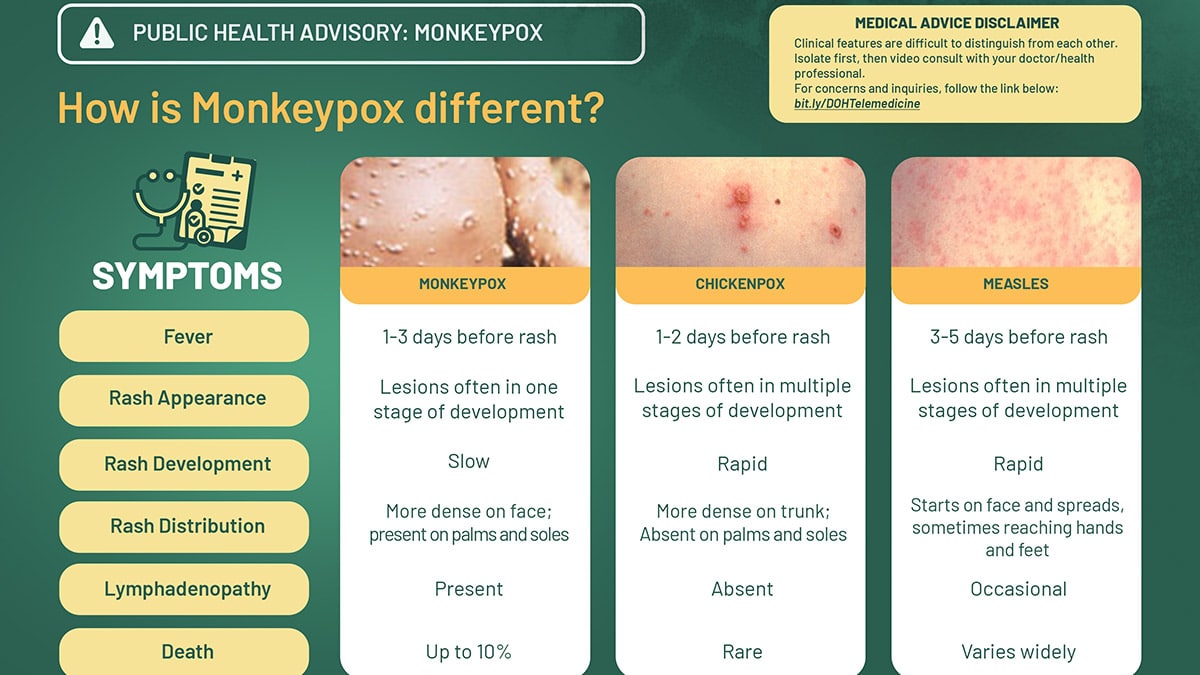1st mpox case this year is Metro Manila man – DOH

WARNING TO THE PUBLIC The Department of Health, through its website and social media platforms, has released public advisories to educate people about the symptoms of mpox and how these are different from rashes caused by chickenpox and measles.
MANILA, Philippines — The Department of Health (DOH) has confirmed the first mpox case in the country since December last year, identifying the patient as a 33-year-old male from the National Capital Region (NCR).
In a press conference on Monday, Health Secretary Teodoro Herbosa said the patient had “no travel history outside of the country, but [had] close, intimate contact [with other people] three weeks before symptom onset.”
“This means that the mpox virus is already in the country, that it is among us. This is not imported anymore. This is a warning to everybody that there is already a community transmission of the disease,” Herbosa said, adding that contact tracing was being conducted to determine people who could have been the source and those who could have been infected by him.
READ: Mpox is now a global health emergency, will it trigger another pandemic?
When asked about the strain of the virus, DOH spokesperson Albert Domingo said: “We are awaiting sequencing results and will update once available.”
The World Health Organization (WHO) on Aug. 14 declared mpox a global public health emergency, its highest form of alert, following an outbreak in the Democratic Republic of Congo that had spread to neighboring countries Burundi, Rwanda and Uganda.
The next day the first mpox case outside Africa, since the outbreak in the Congo, was confirmed in Sweden, with its authorities saying the virus stemmed from a new variant.
This was followed by Pakistan confirming on Aug. 16 at least three mpox cases, saying the patients were travelers who had arrived from the Middle East.
In the Philippines, mpox had been reported in the past but it had not spread. The DOH said the 33-year-old man was the 10th laboratory-confirmed case, the first case being a traveler from abroad diagnosed in July 2022.
Regarding the latest case, “Symptoms started more than a week ago with fever, which was followed four days later by findings of a distinct rash on the face, back, nape, trunk, groin, as well as palms and soles,” the DOH said in a statement.
The patient, currently being monitored in an undisclosed government hospital, was confirmed positive for mpox following a real-time PCR (polymerase chain reaction) test. Specimens from his skin lesions were also examined.
Symptoms
The disease, caused by the monkeypox virus, is transmitted by infected animals and can be passed among humans through close physical contact.
The virus can also be transmitted through contact with surfaces and things touched by an infected person.
Mpox leads to flu-like symptoms and pus-filled lesions. It is usually mild but can kill.
Symptoms may start within 21 days of exposure to the virus. If a patient has flu-like symptoms, they may likely develop a rash one to four days later.
The rash may be preceded or followed by fever, chills, respiratory symptoms (such as sore throat, nasal congestion, or cough), headache, muscle aches, back pain, low energy, and swollen glands (lymph nodes).
Blisters or sores may develop and can affect the face, palms, soles of the feet, and groin. Lesions may also be found in the mouth, throat, anus, rectum, or vagina, or on the eyes.
Some patients may also develop inflammation in the rectum or the genitals.
In most cases, patients can recover within a few weeks with supportive care, such as medication for pain or fever.
But newborn babies, children, those pregnant, and people with immune deficiencies are at higher risk of developing a more severe disease that can lead to complications or even death.
The mpox virus is split into two types: Clade I and Clade II.
Clade I, which is endemic to Central Africa, causes more severe illness and deaths. Clade II, which is endemic to West Africa and caused the global outbreak that began in 2022, is less severe, with an almost 100-percent survival rate.
‘We can handle situation’
The DOH said earlier that the previous nine recorded cases in the country, including the five cases last year, were not fatal and all these patients recovered soon after.
Still, Herbosa urged the public to frequently wash hands with soap and water and to use gloves when there is a need to be in contact with contaminated materials.
Otherwise, mpox is “self-limiting,” with infected patients being cured over time with little medical treatment, he said.
There are two vaccines recommended by the WHO but these are not currently available in the Philippines.
Because of mpox rashes or lesions being similar to that of chickenpox (“bulutong tubig”), shingles, or herpes, Herbosa urged those with symptoms to consult a doctor, especially a dermatologist, to have them tested in a laboratory.
The list of hospitals includes the Research Institute for Tropical Medicine, San Lazaro Hospital, East Avenue Medical Center, Jose Reyes Memorial Medical Center, Jose N. Rodriguez Memorial Hospital, Quirino Memorial Medical Center, and the Philippine General Hospital, among other facilities.
“The DOH will make the testing process as convenient as possible, so that suspect cases may be identified fast and allowed to stay at home,” Herbosa said.
“Our health system is working. We can handle the situation and will keep the public well-informed,” he added.
—WITH A REPORT FROM INQUIRER RESEARCH
Sources: Inquirer archives, who.int, cdc.gov